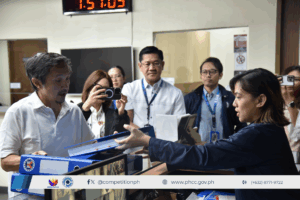By Beatriz Marie D. Cruz, Reporter
A PROPOSAL to use blockchain technology to enhance transparency in the national budget process would require significant investment in digital infrastructure and safeguards to prevent insider misuse, analysts said.
“Blockchain technology is not a silver bullet,” Lito M. Villanueva, founding chairman of FinTech Alliance Philippines, said in a Viber message. “While it ensures immutability of records, risks can still emerge from endpoints, insider misuse or poorly designed smart contracts.”
He said the proposed blockchain-based budget system should be rolled out in phases and anchored on clear governance standards, with public-private collaboration to ensure effective oversight. “Safeguards must therefore cover the whole ecosystem, not just the blockchain ledger itself,” he added.
Senate Bill No. 1330, filed last week by Senator Paolo Benigno “Bam” A. Aquino IV, seeks to establish a blockchain-based budget system that records transactions across the entire budget cycle in real time and immutable form. Budget preparation, legislation, execution and audit would all be logged into digital public assets accessible through a public-facing portal.
Mr. Aquino said the measure would help deter corruption. “No more fly-by-night contractors. No more hidden projects unknown to local governments,” he said in the bill’s explanatory note.
The Philippines, struggling with record-high debt and limited fiscal space, has faced growing scrutiny over corruption in infrastructure projects. Last month, the Department of Budget and Management (DBM) launched its own blockchain platform to track public funds.
“From our own rollout of blockchain for budget documents in DBM, we’ve seen that the technology works,” Budget Secretary Amenah F. Pangandaman told BusinessWorld in a Viber message. “The challenge is really about making it fit with existing government systems and making sure people know how to use it.”
She said training would be crucial to ensure government workers, auditors and the public understand and apply the system. “Even if the system is secure, it won’t be effective unless our government workers and the public can easily understand and apply it.”
Paul Soliman, chairman and chief executive officer at BayaniChain Ventures, the local firm behind DBM’s blockchain platform, said the system must align itself with cybersecurity standards.
“Vulnerabilities in government applications, identity theft of officials approving transactions, or poorly secured nodes could become attack points,” he said.
Mr. Soliman recommended hybrid security measures such as strong encryption, zero-trust frameworks and continuous monitoring. He added that inclusivity is also vital, with blockchain records viewable through public dashboards, SMS queries or mobile apps.
“Blockchain is not a magic solution, but it can be a strong foundation,” Ms. Pangandaman said. “If we combine the right technology, good governance and support from institutions, we can open a new era of transparency and accountability in government.”






